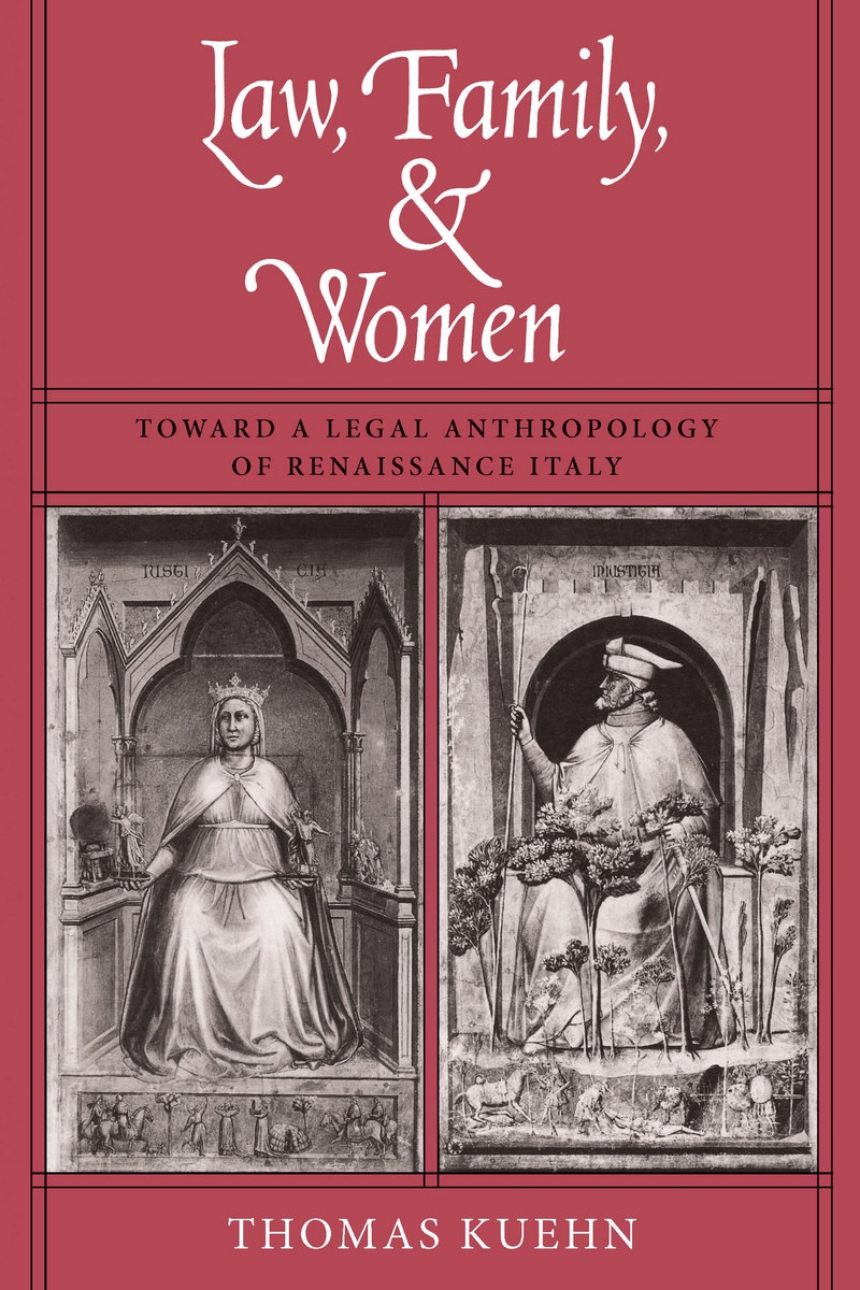Law, Family, and Women
Toward a Legal Anthropology of Renaissance Italy
Focusing on Florence, Thomas Kuehn demonstrates the formative
influence of law on Italian society during the Renaissance,
especially in the spheres of family and women. Kuehn’s use
of legal sources along with letters, diaries, and
contemporary accounts allows him to present a compelling
image of the social processes that affected the shape and
function of the law.
The numerous law courts of Italian city-states
constantly devised and revised statutes. Kuehn traces the
permutations of these laws, then examines their use by
Florentines to arbitrate conflict and regulate social
behavior regarding such issues as kinship, marriage,
business, inheritance, illlegitimacy, and gender. Ranging
from one man’s embittered denunciation of his father to
another’s reaction to his kinsmen’s rejection of him as
illegitimate, Law, Family, and Women provides
fascinating evidence of the tensions riddling family life in
Renaissance Florence. Kuehn shows how these same tensions,
often articulated in and through the law, affected women. He
examines the role of the mundualdus—a male legal guardian
for women—in Florence, the control of fathers over their
married daughters, and issues of inheritance by and through
women. An ambitious attempt to reformulate the agenda of
Renaissance social history, Kuehn’s work will be of value to
both legal anthropologists and social historians.
Thomas Kuehn is professor of history at Clemson
University.
influence of law on Italian society during the Renaissance,
especially in the spheres of family and women. Kuehn’s use
of legal sources along with letters, diaries, and
contemporary accounts allows him to present a compelling
image of the social processes that affected the shape and
function of the law.
The numerous law courts of Italian city-states
constantly devised and revised statutes. Kuehn traces the
permutations of these laws, then examines their use by
Florentines to arbitrate conflict and regulate social
behavior regarding such issues as kinship, marriage,
business, inheritance, illlegitimacy, and gender. Ranging
from one man’s embittered denunciation of his father to
another’s reaction to his kinsmen’s rejection of him as
illegitimate, Law, Family, and Women provides
fascinating evidence of the tensions riddling family life in
Renaissance Florence. Kuehn shows how these same tensions,
often articulated in and through the law, affected women. He
examines the role of the mundualdus—a male legal guardian
for women—in Florence, the control of fathers over their
married daughters, and issues of inheritance by and through
women. An ambitious attempt to reformulate the agenda of
Renaissance social history, Kuehn’s work will be of value to
both legal anthropologists and social historians.
Thomas Kuehn is professor of history at Clemson
University.
430 pages | 11 tables | 6 x 9 | © 1991
History: European History
Law and Legal Studies: Legal History
Table of Contents
List of Tables
Acknowledgments
Introduction
Part One: Law
1. Law and Arbitration in Renaissance Florence
2. Dispute Processing in the Renaissance: Some Florentine Examples
3. Conflicting Conceptions of Property in Quattrocento Florence: A Dispute over Ownership in 1425-26
Part Two: Family
4. Honor and Conflict in a Fifteenth-Century Florentine Family
5. A Reconsideration of Self-Disciplining Pacts among the Peruzzi of Florence
6. Reading between the Patrilines: Leon Battista Alberti’s Della Famiglia in Light of His Illegitimacy
7. "As If Conceived within a Legitimate Marriage": A Dispute Concerning Legitimation in Quattrocento Florence
Part Three: Women
8. Women, Marriage, and Patria Potestas in Late Medieval Florence
9. "Cum Consensu Mundualdi": Legal Guardianship of Women in Quattrocento Florence
10. Some Ambiguities of Female Inheritance Ideology in the Renaissance
Appendix: Examples of Arbitration
Notes
Bibliography
Index
Acknowledgments
Introduction
Part One: Law
1. Law and Arbitration in Renaissance Florence
2. Dispute Processing in the Renaissance: Some Florentine Examples
3. Conflicting Conceptions of Property in Quattrocento Florence: A Dispute over Ownership in 1425-26
Part Two: Family
4. Honor and Conflict in a Fifteenth-Century Florentine Family
5. A Reconsideration of Self-Disciplining Pacts among the Peruzzi of Florence
6. Reading between the Patrilines: Leon Battista Alberti’s Della Famiglia in Light of His Illegitimacy
7. "As If Conceived within a Legitimate Marriage": A Dispute Concerning Legitimation in Quattrocento Florence
Part Three: Women
8. Women, Marriage, and Patria Potestas in Late Medieval Florence
9. "Cum Consensu Mundualdi": Legal Guardianship of Women in Quattrocento Florence
10. Some Ambiguities of Female Inheritance Ideology in the Renaissance
Appendix: Examples of Arbitration
Notes
Bibliography
Index
